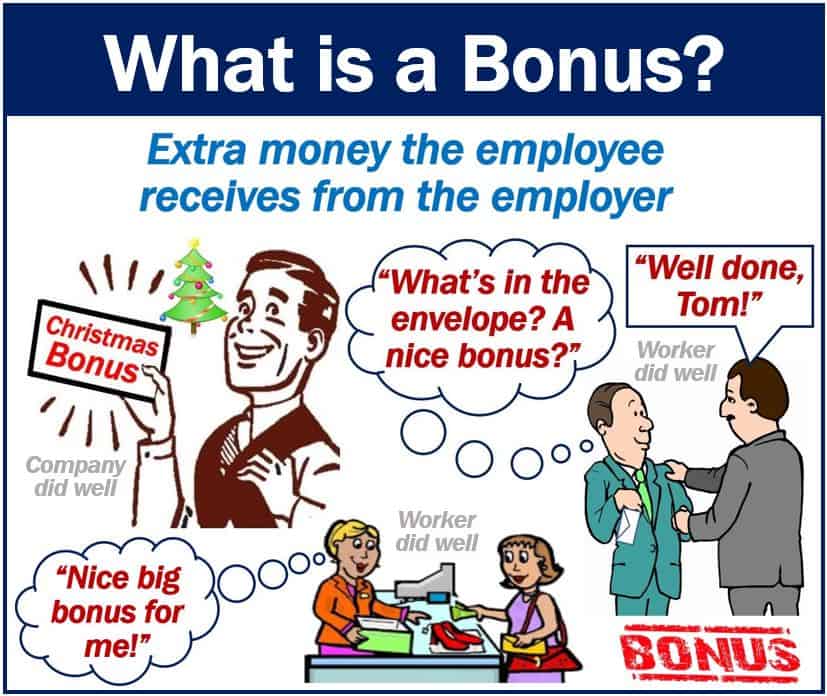A Bonus is extra money that an employee receives on top of his or her wages or salary. The person may receive the extra payment for good performance. Sometimes, all employees in a company receive extra money at a certain time of the year. For example, if they get an extra payment at Christmas, it is a Christmas bonus.
A company may give its shareholders bonuses, as in: “Acme Limited is set to give its shareholders a bonus of $1 per share.”
Insurance companies give customers bonuses if they have a very profitable year.
In a general English, non-business context, the term can mean a benefit or advantage. For example, I might say: “The proximity to shops is an added bonus, but the real appeal is the incredible view.”

Companies that participate in ‘gains sharing,’ give their employees bonuses when profits or productivity increase.
The term does not mean the same as profit sharing, which occurs when a company gives its workers a percentage of its profits on top of their salaries.
Bonus vs. commission
Both terms refer to payments that employers make to employees on top of basic wages and salaries.
However, commissions are usually based on the employee’s performance, while bonuses are based on the business’ performance.
This is not a strict rule. Sometimes people get bonuses because they performed well. It depends on how a company uses the term.
Put simply, bonuses may relate to either the employee’s or company’s performance, but not commissions. Companies only pay a commission when an employee has performed well.
In other words, the term ‘bonus’ may mean ‘commission,’ but ‘commission’ never means ‘bonus’ when it refers to the company’s performance.
For example, a saleswoman who sells shoes may get a 10% commission on sales. This means that if she sells a pair of shoes for $100, she’ll get a commission of $10. Some companies may also call this a bonus (less common).
If the shoe shop chain has a good year, it may give all of its employees a bonus. We do not call this a commission, because it relates to the company’s performance, not the employees’.

Fat-cat bonuses – banking
After the Global Financial Crisis of 2007/8, governments had to bail out hundreds of banks across the world. Trillions of dollars of taxpayers’ money were used to save banks.
Many top banking executives received generous bonuses. When taxpayers and shareholders found out that executives continued paying themselves bonuses after the bailouts, they were angry.
Taxpayers protested and shareholders rebelled. A shareholder rebellion occurs when shareholders vote against the board of directors.
In 2014, for example, Barclays’ board voted to increase its staff bonus pool by 10%. However, profits had declined by 30% that year. Standard Life, a major Barclays shareholder, voted against the proposal.
In the UK, ‘fat cats‘ refers to top executives who pay themselves generously, even when their companies are failing. It is a derogatory term.
Getting customers to buy more
We sometimes use the term when talking about an incentive scheme we aim at customers. It could be part of a customer motivational program to encourage them to buy more of the company’s products.
Some companies call it an incentive program or bonus scheme.
